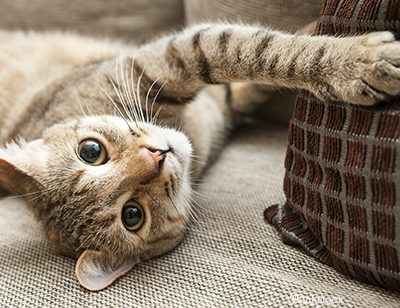
It’s a sad fact that only about 1% of dogs and cats in America are covered by pet insurance. This number is dwarfed by countries like Sweden (where about 50% are insured) and the United Kingdom (where about 35% are insured)1.
What’s even more interesting is that my experience tells me only a fraction of this insurance is for cats, even though there are more cats to be insured than dogs! Data available on humanesociety.org shows that cats outnumber dogs in the U.S. It also shows that 55% percent of cat owners have more than one cat. I have eight cats at home, and only five dogs, which, I guess makes me pretty typical (and a little crazy!). With all of this cat love, what is it that makes many of us assume that cats need any less protection (insurance)?
Based on a few feline characteristics, I actually think cats may need to use insurance even more frequently than dogs.
[Editors Note: It’s a good idea to insure all pets, click here for information about dog insurance.]
Why is insurance important for cats?
I’ve learned more than a few of my own “cat facts” over the years that I’d like to share with you — maybe some will ring true for you, while others won’t. Either way, I hope they get you to start asking yourselves why you’ve hesitated or chosen not to purchase insurance for your own cats.
First, from my experience (over 30 years in practice), cats seem to have a tendency to hide their symptoms better than their canine counterparts. So, by the time you notice something’s wrong, the problem may already be very serious and therefore, more costly to diagnose and treat.
Click here to learn how to tell your cat is secretly sick.
Also, because dogs are a bit more social, and often seem to thrive on interaction, we tend to spend more time with our dogs — we socialize and play with them more often. This time allows us to better evaluate when they are “ADR” (Ain’t Doin’ Right). We tend to be able to recognize when they’re “off” much earlier than we do for cats. Our more independent feline friends are generally more aloof and often like to be by themselves. Generally, they’re not as active — making it more difficult to notice when they are just not themselves and a problem might be brewing. This is especially true of outdoor or even indoor/outdoor cats that we may not normally see for a day or longer. Clearly, recognizing a problem in these cats (especially a subtle one) would be very challenging.
Click here for reasons why keeping your cats indoors can help keep them safe.
I hope many of you would agree with these observations, and that you can now appreciate the importance of helping to protect your cats with insurance. Though most cats are generally smaller than dogs (I say “most,” because two of my eight are over 20lbs!), the cost of their medical care can be just as much.
Now please put my words into your actions — consider pet insurance for your cats ASAP!
If you have any questions or concerns, you should always visit or call your veterinarian -- they are your best resource to ensure the health and well-being of your pets.
Resources:
